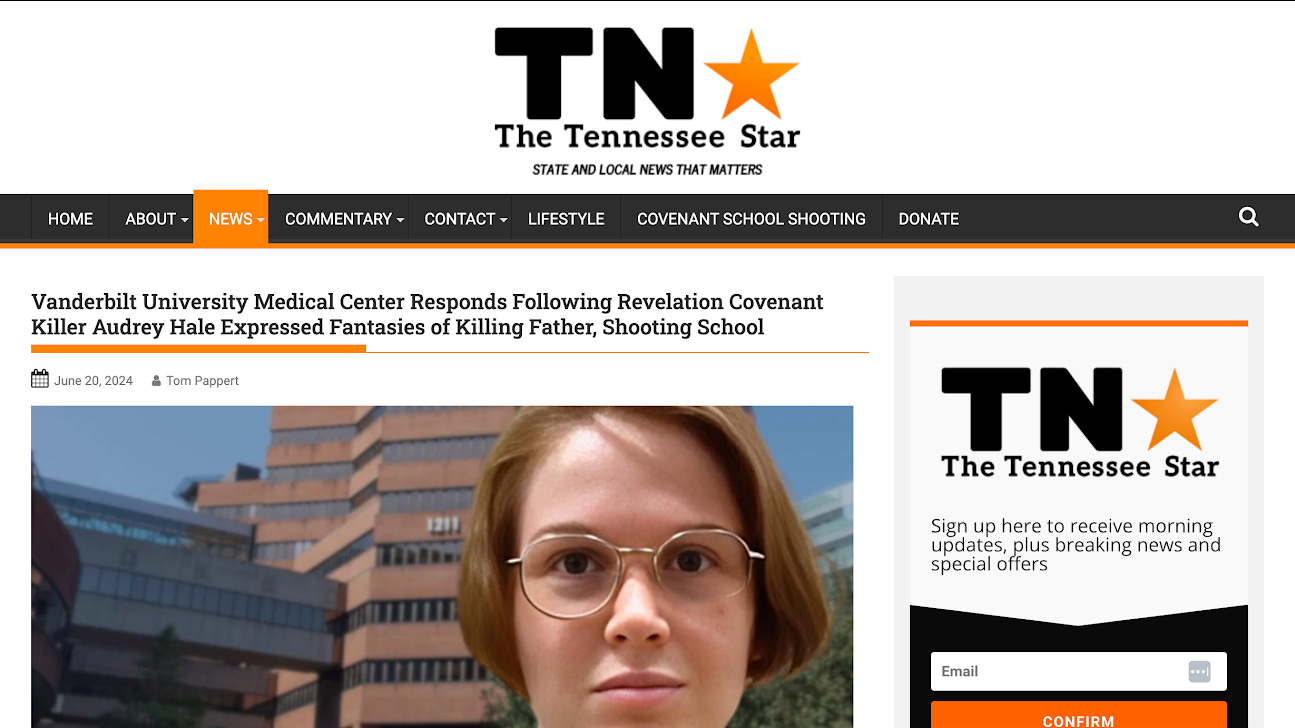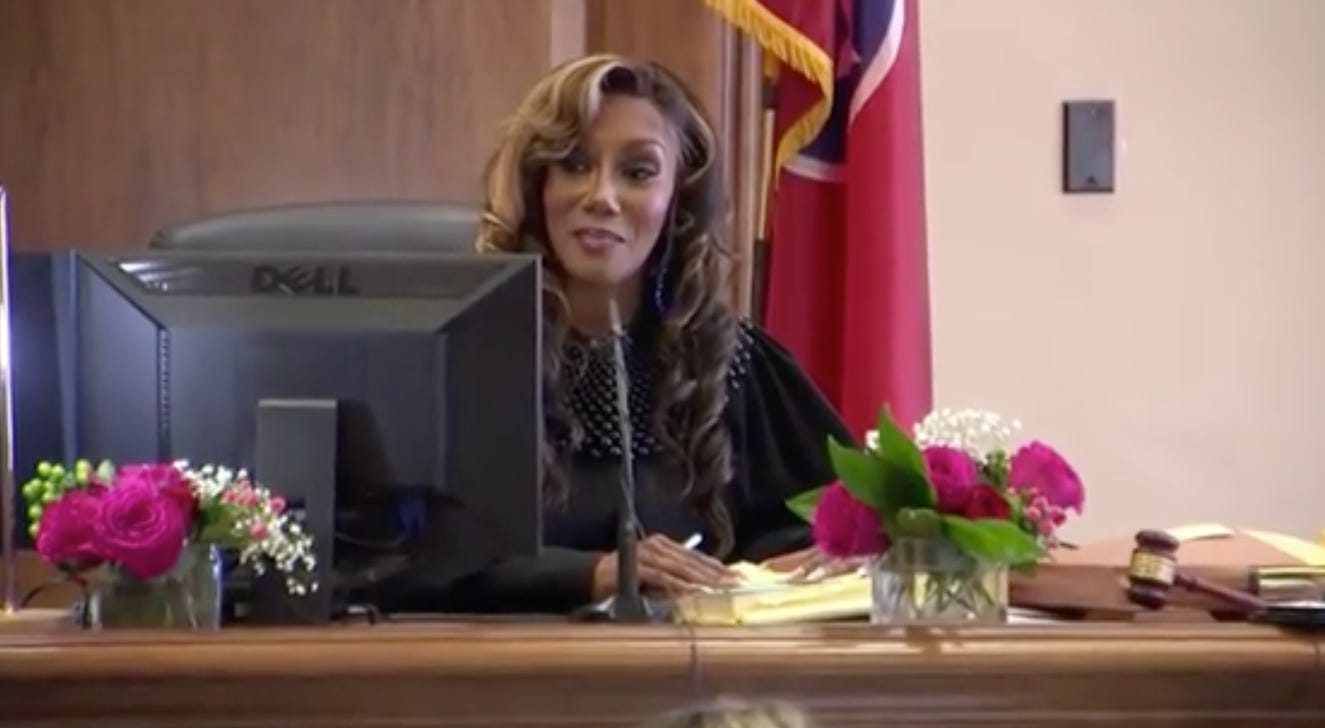A Tennessee journalist is being threatened with jail time for reporting on a school shooter’s ‘manifesto’
When access to information is blocked, we are less safe from harm, not more.
A note from Greg: From here on out ERI will be expanding to include occasional guest posts authored by some of my talented friends and colleagues. This week I’m thrilled to share a piece from my frequent collaborator, FIRE’s Vice President of Strategic Initiatives Adam Goldstein.
Last March, a 28-year-old former student spent 16 minutes revisiting his Christian elementary school in Nashville, Tennessee. During that time, he killed three adults and three nine-year-old children before being killed by local police.
The shooter, Aiden Hale (a trans-man sometimes referred to by his birth name, Audrey Hale), left behind a collection of writings documenting his thoughts in the months leading up to the shooting. As a statement from the Metro Nashville Police Department described them:
“In the collective writings by Hale found in her vehicle in the school parking lot, and others later found in the bedroom of her home, she documented, in journals, her planning over a period of months to commit mass murder at The Covenant School.”
Some reports describe it as diaries. Others, as a manifesto. We know a little bit about what it contains from leaks. Earlier this month, the Tennessee Star obtained 80 pages of these writings and has been reporting from them. Some examples:
Hale repeatedly wrote about how “everything hurts,” relating it to his secondary sexual characteristics and being misgendered;
A month before the attack, Hale wrote, “The caccoon [sic] of my old self will die when I leave my body behind and the boy in me will be free; in my butterfly transformation; the real me”;
About his father, Hale wrote, “I want to kill you” and “Dad is not real”; and
A month before the shooting, Hale wrote about how some groups had more “rights” than others: “So now in America, it makes one a criminal to have a gun or, be transgender, or non-binary[.]”
Meanwhile, in Nashville, a journalist is being threatened with jail time for these reports.
Police are claiming the writings are part of an ongoing investigation, and a judge overseeing an open records lawsuit ordered Tennessee Star Editor-in-Chief Michael Patrick Leahy to explain why he shouldn’t be held in contempt for their publication. Threatening journalists with jail time for publishing truthful information isn’t something we’re supposed to be doing in this country.
The open records lawsuit
In May of 2023, the Star and Leahy sued the Nashville Police Department, seeking to get copies of Hale’s writings. We’ll just call them “The Documents” going forward to keep it simple. Police have withheld them as part of an “ongoing investigation.”
The judge overseeing this case is Chancellor I’Ashea Myles. (She’s called “Chancellor” and not “Judge” because Tennessee still has separate courts of law and equity… y’know what? Explaining this will needlessly derail the story. Let’s go with this: She’s a judge, but she’s called “Chancellor” because in Tennessee some things just are.)
When some of The Documents were leaked in February, Chancellor Myles issued two orders limiting how the parties to the open records lawsuit could refer to leaked documents in court. You can read them in those links, but the short version is, Chancellor Myles ordered that nothing containing The Documents or information from them should be filed in court in a way that lets the public see them.
For example, if one of the organizations involved in the case wanted to argue that the public should have access to The Documents because something specific in the leaks implicated public safety, they would bring their argument to the judge to read in private, so the court records system would not be “the source” of leaks.
On June 4, the Star started to publish stories including information from The Documents. About a week later, Chancellor Myles was asked by a reporter for a statement or comment reacting to these leaks. Myles reacted by, on the same day, issuing an order setting “a Show Cause hearing to determine why the alleged publication of certain purported documents by Petitioners Star Digital Media and Michael Leahy, as the editor-in-chief, does not violate the Orders of this Court subjecting them to contempt proceedings and sanctions.”
In other words, Chancellor Myles decided to bring the Star and Leahy to court to explain how they didn’t violate her court order.
This is absurd on its face. In order to be in contempt of an order not to publish, there has to actually be an order not to publish. Chancellor Myles’ prior orders regarding The Documents did not prohibit their publication in newspapers; they prohibited making court filings on the public record that included leaked information — which Leahy didn’t do.
Given this, Myles’ actions raise an obvious question: If publication of The Documents was also something Myles didn’t want, why didn’t her orders include that as a specific prohibition? Likely because if they did, those orders would be unconstitutional prior restraints.
Back to Basics: Prior restraint is presumptively unconstitutional
As FIRE’s First Amendment glossary explains, prior restraint is “[t]he practice of prohibiting publications or speech before they are published or communicated (restraining individuals prior to their speaking).” When a court issues a prior restraint, there is, in the words of the Supreme Court, “a heavy presumption against its constitutional validity.”
The vast majority of speech (including republished manifestos from the addled) is protected by the First Amendment. For the tiny sliver of speech not protected, most of it falls into areas where economic damages or state sanction would serve to vindicate people who were harmed. For example, if you defame me, I have the option to sue you and recover the value of my reputation in money; it isn’t necessary to silence your speech before it happens. It would only be the most extraordinary of circumstances — for example, where the disclosure would create the imminent risk of loss of life — where a prior restraint would be justified.
Why is this protection so broad? There are a few different arguments. Greg’s “pure informational theory of freedom of speech” is the broadest and simplest: We can’t know the world without knowing what people actually think or believe — or at least are willing to say. All speech communicates something, and because we can’t predict which speech will turn out to have some value, we should protect as much of it as we possibly can. In this case, there’s a lot we can learn about Aiden Hale and the situation that led to his actions last March by reading the writings he left behind — including ways we can spot the makings of this kind of tragedy sooner and possibly prevent similar tragedies from happening again.
Prior restraints were among the original grievances that led to the American colonies demanding independence (although, in slight defense of King George, requiring prior approval of the state before publishing was the status quo in Europe). That heritage is baked into roughly the last 93-ish years of Constitutional law (it took a while for courts to figure out what, exactly, the First Amendment meant in practice).
Limiting how parties can file documents in Chancellor Myles’ own courtroom didn’t restrain the ability to submit them to the court. Myles just required they be submitted to her for private review in her chambers, and not filed as part of the public record anyone could read. Nothing on the face of those orders restrains publishing newspaper stories. If they had, it surely would have been opposed sooner, given the protections against prior restraint.
These records should be released
The primary argument against the publication of The Documents is that they could inspire copycats. But the absence of that information hasn’t stopped that. Already, a Maryland high school student was arrested after writing his own “manifesto,” a 127-page document outlining a plan for a school shooting, saying he found Hale “relatable.” That arrest was in April, before the Star reported from the recent leaks, though after a couple of pages leaked in November 2023.
Instead, withholding the actual Documents creates an opportunity for things to get worse. The lack of an official source for what is in The Documents could enable dozens of ersatz manifestos to circulate, each one with the same probability of being eagerly taken up by a copycat. Suppressing these writings does nothing to keep us safer. What it does is allow the incident to be abused by anyone with an ideological leaning toward violence.
Most importantly, we — the public, as a whole — have a right to know what led Hale to the Covenant School in March of 2023. The risk that a mass shooting incident like this could be repeated is an argument for more study of these words, not less.
School shootings are horrors that no one wants to ever have to endure. But they are an unfortunate reality. And while the impulse to avoid inspiring others by suppressing the details is, perhaps, understandable, the study of those details is critical to the effort of ensuring similar tragedies don’t keep happening.
For more on this case, check out the excellent work of Deborah Fisher, Executive Director of the Tennessee Coalition for Open Government, who put together a timeline here.
SHOT FOR THE ROAD
Greg had a blast geeking out about the philosophy and history of free speech with Dave Hoffman and Ryan Sean Adams on the Bankless podcast. Enjoy!






I find it odd that even in the case of a psychotic mass murderer, some people feel the need to "respect their pronouns".
Audrey Hale was a woman, why are you being silly?